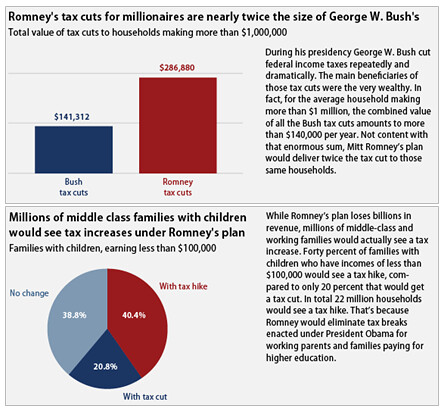One day after branding President Obama "really out of touch with what's happening in America," Mitt Romney marked his Florida primary victory by declaring, "I'm not concerned about the very poor." Of course, back in December Romney announced that "I'm concerned about the poor in this country," adding, "We have to make sure the safety net is strong and able to help those who can't help themselves."
If Mitt Romney's latest statement seems like a contradiction, at least it's a more honest one. After all, his proposal to slash $700 billion in Medicaid spending and send what's left as block grants to the states would devastate the program serving nearly 60 million poor and elderly Americans. But as it turns out, his 59 point, 162 page economic plan isn't very concerned with the middle class, either. Over the next decade, that budget-busting blueprint would drain $6.6 trillion from the U.S. Treasury and divert most of it into the pockets of the richest Americans.
On Wednesday, Romney explained his devil-may-care attitude towards the 46.2 million Americans now living in poverty and the 51 million more with incomes less than 50 percent above the poverty line:
"I'm not concerned about the very poor. We have a safety net there," Romney told CNN. "If it needs repair, I'll fix it. I'm not concerned about the very rich, they're doing just fine. I'm concerned about the very heart of America, the 90 percent, 95 percent of Americans who right now are struggling."
That's an odd statement for Mitt Romney to make, and not merely because he previously declared himself part of "the 80 to 90 percent of us" who are middle class. Romney's own economic plan says otherwise. Romney's isn't worried about fixing the safety net; he wants to shred it. And in December, Chris Wallace of Fox News called him on it.
WALLACE: But you don't think if you cut $700 billion dollars in aid to the states that some people are going to get hurt?
ROMNEY: In the same way that by cutting welfare spending dramatically, I don't think we hurt the poor. In the same way I think cutting Medicaid spending by having it go to the states run more efficiently with less fraud, I don't think will hurt the people that depend on that program for their healthcare.
It's not just that Romney's block grant program would lead governors to begin "capping enrollment, thinning benefits, increasing co-payments, and so on" in the future. As Ezra Klein explained, they are already doing that now:
Twenty states implemented benefit restrictions in the past year. In fiscal year 2010, 39 states implemented Medicaid provider rate cuts or freezes (up from 33 in fiscal year 2009), and 37 states have provider rate restrictions planned for the next fiscal year.
And as the Kaiser Family Foundation determined last year, the Ryan plan championed by Mitt Romney and virtually every Republican in Washington to repeal the Affordable Care Act would certainly hurt working Americans as well:
"By 2021, between 31 million and 44 million fewer people nationally would have Medicaid coverage under the House Budget Plan relative to expected enrollment under current law."
Then there's Mitt Romney's tax plan.
That's the one he claimed was focused on the middle class. It's not just that his proposal to make the Bush tax cuts permanent and eliminate the capital gains tax on the first $200,000 of investment income does not help the middle class, it's that Mitt Romney would deliver another gilded-class payday to the very rich, himself included.
Last month, McClatchy reported that the "Romney tax plan would most benefit [the] wealthy." The Center for American Progress explained just how much. While "Romney's plan also gives nearly 60 percent of its benefit to the richest 1 percent of Americans," Mitt's tax cuts for millionaires are "nearly twice the size of those from George W. Bush."
And that was before Mitt Romney's spontaneous outburst during a debate last month that he would really like a top rate of 25 and not 35 percent.
It's worth noting that Romney, the $250 Million Man, has also proposed eliminating the estate tax. Compared to the current 35 percent rate on estates larger than $10 million, Mitt's tax plan would give his heirs roughly $84 million courtesy of the U.S. Treasury and all other American taxpayers. With his plans to extend the Bush tax cuts, lower the corporate tax rate, and repeal some high-income tax increases from the Affordable Care Act; the impact of on the national debt would be staggering. As ThinkProgress detailed in September:
Romney's tax plan includes a $6.6 TRILLION giveaway to corporations and the wealthiest Americans. Meanwhile, Romney's Medicaid cuts are even more draconian than the ones in Paul Ryan plan.
So much for Romney's claim that "I want to focus on where the people are hurting the most, and that's the middle class. I'm not worried about rich people. They are doing just fine." But at least Mitt Romney was telling the truth when he said, "I'm not concerned about the very poor."
Or, it turns out, the middle class, either.
(This piece also appears at Perrspectives.)



















